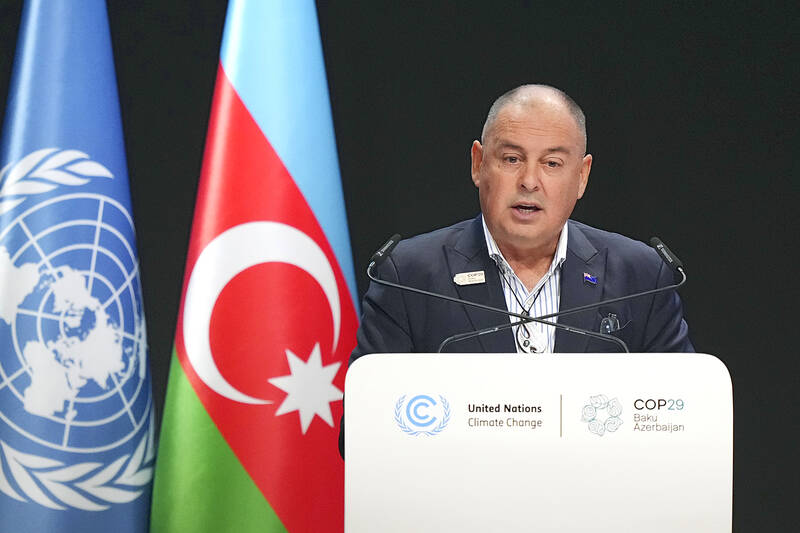Cook Islands officials yesterday said they had discussed seabed minerals research with China as the small Pacific island mulls deep-sea mining of its waters.
The self-governing country of 17,000 people — a former colony of close partner New Zealand — has licensed three companies to explore the seabed for nodules rich in metals such as nickel and cobalt, which are used in electric vehicle (EV) batteries.
Despite issuing the five-year exploration licenses in 2022, the Cook Islands government said it would not decide whether to harvest the potato-sized nodules until it has assessed environmental and other impacts.

Photo: AP
Cook Islands Prime Minister Mark Brown has nevertheless touted the benefits of the potentially multibillion-dollar industry, saying last year that the country needs to protect itself against climate change “through whatever revenues that we can get.”
Officials from the Cook Islands Seabed Minerals Authority said they had engaged in high-level talks with Chinese research institutes when they joined Brown on a five-day state visit to China this week.
Talks with Chinese researchers highlighted “collaborative opportunities” in areas including seabed minerals, the Cook Islands’ body said in a statement.
The delegation also spoke about potentially working together on marine and deep-sea exploration technology, it said.
“These conversations have opened the door to new areas of collaboration,” said Brown, who is also the minister of seabed minerals.
Brown’s China visit — during which he was expected to sign a “joint action plan” for a comprehensive strategic partnership with Beijing — has raised hackles in New Zealand.
New Zealand Minister of Foreign Affairs Winston Peters’ spokesperson complained this week of a lack of consultation over the trip, describing it as “a matter of significant concern.”
Under the two countries’ free association, Cook Islanders are citizens of New Zealand, which provides budgetary assistance and help in foreign affairs and defense.
China is vying for diplomatic, economic and military influence in the strategically important Pacific, challenging the historic regional sway of the US, New Zealand and Australia.
However, New Zealand itself is rethinking its position on deep-sea mining.
New Zealand Minister for Oceans and Fisheries Resources Shane Jones this week said his government was considering withdrawing the country’s support for an international ban on the practice.
“We can’t deny ourselves the option where critical minerals have an increasingly critical role to play,” he said.
Conservation groups and scientists fear deep-sea mining could devastate poorly understood marine systems that play a crucial role in regulating the climate.

PRECARIOUS RELATIONS: Commentators in Saudi Arabia accuse the UAE of growing too bold, backing forces at odds with Saudi interests in various conflicts A Saudi Arabian media campaign targeting the United Arab Emirates (UAE) has deepened the Gulf’s worst row in years, stoking fears of a damaging fall-out in the financial heart of the Middle East. Fiery accusations of rights abuses and betrayal have circulated for weeks in state-run and social media after a brief conflict in Yemen, where Saudi airstrikes quelled an offensive by UAE-backed separatists. The United Arab Emirates is “investing in chaos and supporting secessionists” from Libya to Yemen and the Horn of Africa, Saudi Arabia’s al-Ekhbariya TV charged in a report this week. Such invective has been unheard of

US President Donald Trump on Saturday warned Canada that if it concludes a trade deal with China, he would impose a 100 percent tariff on all goods coming over the border. Relations between the US and its northern neighbor have been rocky since Trump returned to the White House a year ago, with spats over trade and Canadian Prime Minister Mark Carney decrying a “rupture” in the US-led global order. During a visit to Beijing earlier this month, Carney hailed a “new strategic partnership” with China that resulted in a “preliminary, but landmark trade agreement” to reduce tariffs — but

Chinese President Xi Jinping’s (習近平) purge of his most senior general is driven by his effort to both secure “total control” of his military and root out corruption, US Ambassador to China David Perdue said told Bloomberg Television yesterday. The probe into Zhang Youxia (張又俠), Xi’s second-in-command, announced over the weekend, is a “major development,” Perdue said, citing the family connections the vice chair of China’s apex military commission has with Xi. Chinese authorities said Zhang was being investigated for suspected serious discipline and law violations, without disclosing further details. “I take him at his word that there’s a corruption effort under

China executed 11 people linked to Myanmar criminal gangs, including “key members” of telecom scam operations, state media reported yesterday, as Beijing toughens its response to the sprawling, transnational industry. Fraud compounds where scammers lure Internet users into fake romantic relationships and cryptocurrency investments have flourished across Southeast Asia, including in Myanmar. Initially largely targeting Chinese speakers, the criminal groups behind the compounds have expanded operations into multiple languages to steal from victims around the world. Those conducting the scams are sometimes willing con artists, and other times trafficked foreign nationals forced to work. In the past few years, Beijing has stepped up cooperation